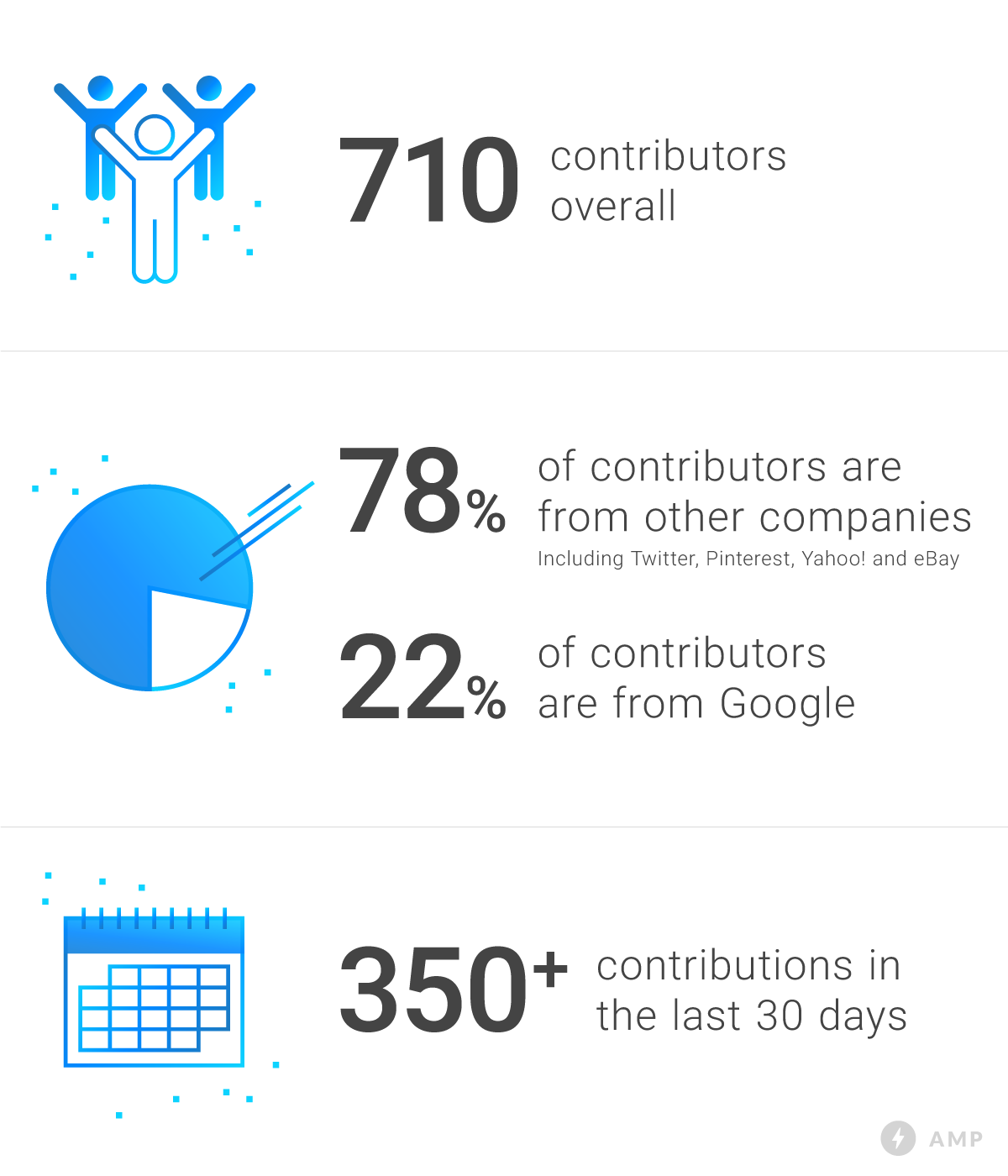Update 12/03/2018: This proposal is now in effect.
Update 10/10/2019: AMP is joining the OpenJS Foundation incubation program
Update 6/26/2020: AMP graduates the OpenJS Foundation Incubation program
Over the last 2 years AMP has grown from a tiny open source project with just 2 contributors to a much larger one with over 700 folks contributing over 10,000 commits running on many millions of websites. When choosing a governance model (a system that describes how decisions are made) for AMP, we initially focused on agility. AMP has always been powered by the voices and feedback of the developers and organizations that use it; however, governance was centered around the tech lead (which is me, the author of this post 🤣), who ultimately decided what got executed and how.
While this works great for smaller projects, we’ve found that it doesn’t scale to the size of the AMP Project today. Instead we want to move to a model that explicitly gives a voice to all constituents of the community, including those who cannot contribute code themselves, such as end-users. The change we are proposing is based on months of research, through which we’ve decided to follow the lead of the Node.js project and move to a consensus-seeking governance model.

When creating this proposal for a new governance model for AMP the AMP team had a few goals in mind, including:
- Encourage a wider variety of voices at all levels of contribution, including code contributions, setting the future direction of AMP and deciding which features and bug fixes should be worked on. This also means ensuring that the voices of those who do not contribute with code, but are nonetheless impacted by AMP, get heard.
- Make it more clear how an individual and a company can have a voice in AMP, from approving code changes to setting AMP’s technical and product roadmap.
- Avoid slowing down day-to-day work on AMP due to the governance model. The net effect of changes to the way people work on AMP should be neutral to positive in terms of productivity.
- Learn from what’s worked and what hasn’t worked for other open source projects. To this end the AMP team talked to people from projects such as Node.js and Kubernetes, looked at governance philosophies from places like the JS Foundation and reviewed a wide variety of other open source and web standards governance documents.
The proposal has full details but some of the significant changes proposed in the new model are:
- The power to make significant decisions in the AMP Project will move from a single Tech Lead to a Technical Steering Committee (TSC) which includes representatives from companies that have committed resources to building AMP, with the end goal of not having any company sit on more than a third of the seats.
- An Advisory Committee with representation from many of AMP’s constituencies will advise the TSC.
- Working Groups with ownership over certain aspects of AMP (such as the UI, infrastructure and documentation) will replace the informal teams that exist today. These Working Groups will have a clear mechanism for input and a well-defined decision making process.
One of our first tasks in working towards the new system is to complete the initial membership of AMP’s governance groups. If you are interested in being involved in any of these governance groups please let us know. This is real work, and we want to pay for it if it isn’t covered by your day job! If you need financial support, please let us know in the form. One area that we are particularly interested in is representation from folks with experience in consumer rights and protection. Meanwhile we’re excited to announce that we’ve talked to a few folks up front and they agreed to join the Advisory Committee including representatives from publishers (El País, Washington Post and Terra), e-commerce sites (AliExpress and eBay) and platforms (Cloudflare and Automattic) as well as advocates for an open web (Léonie Watson of The Paciello Group, Nicole Sullivan of Google/Chrome, and Terence Eden).
Additionally, we’re exploring moving AMP to a foundation in the future, and we’ll seek the input of the TSC, the AC, and the community over the coming months. We see the governance changes as a first step in that direction. Update 10/10/2019: This was just announced.
We’re looking forward to working with the rest of the AMP community to refine the governance proposal, including at next week’s AMP Contributor Summit. We encourage you to review and comment on the proposal and attend the design review that has been scheduled to discuss the proposal. The review period for the proposal will end on October 25, 2018 with a goal of implementing the new governance model shortly thereafter.
We’re excited to see the AMP community take this next step, and hope you will join us in making the web a better place for users and developers alike.
Posted by Malte Ubl, Tech Lead for the AMP Project at Google